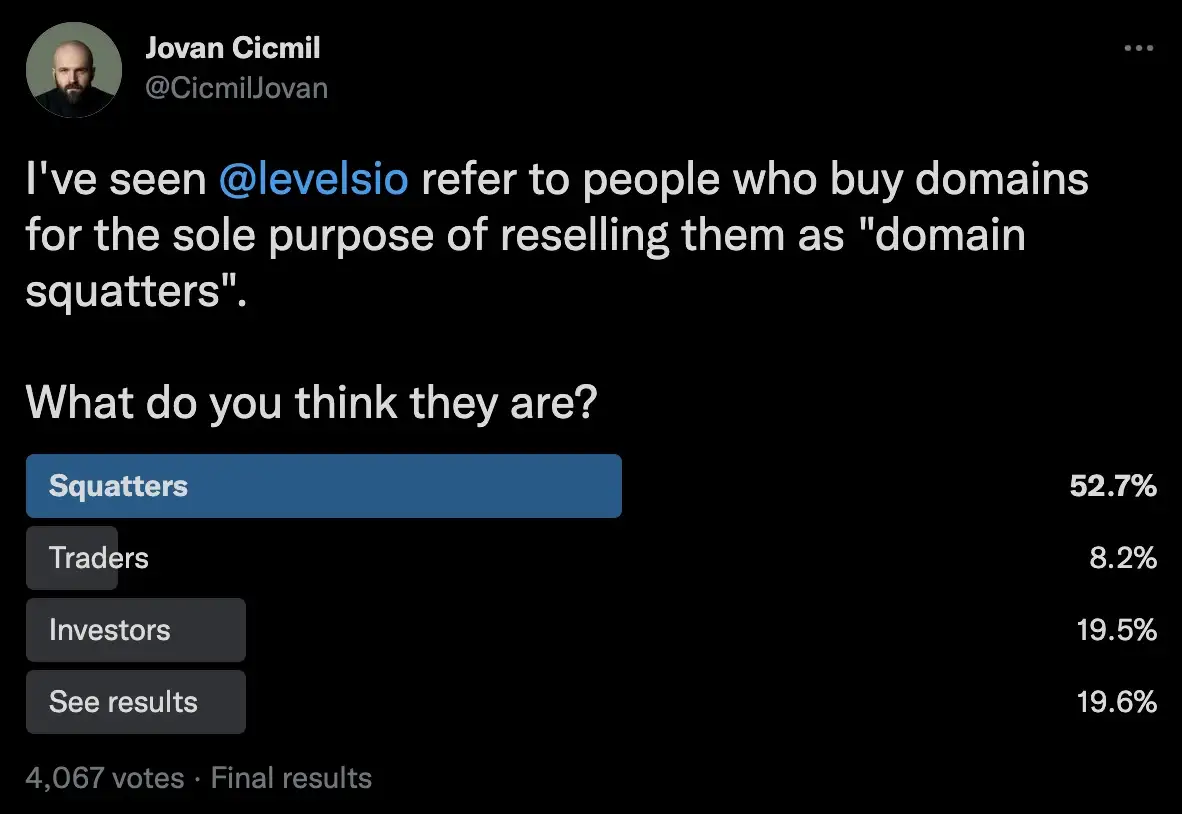
No, not the real world. The digital world. I observed the latest battle personally so that I can report to you from the front lines.
A well-known entrepreneur recently announced that he had bought a .com domain for his company. That’s not big news until you hear the rest: it took 6 years of negotiating and $100,000 to get that domain.
His announcement prompted a war of words between his fellow startup founders and the folks he referred to as domain squatters. These are people that make money by buying and holding domain names in hopes of eventually reselling them for a much higher price.
I took it upon myself to enter the heat of battle to bring to you this report. No, no, keep your Pulitzer. It’s all in a day’s work.
Squatters or investors?
The people our founder friend referred to as squatters take exception to that term. They usually call themselves domain investors. They claim that domain investing is akin to real estate investing — you purchase a piece of property and you sit patiently until somebody comes to you with an offer.
In the real estate world, the buyer is normally someone who wants to build on that land. For some reason, this buyer feels that the location suits their business perfectly and they’re willing to pay a premium for it.
The same applies to domains — to an extent. While the same basic logic applies, the sellers’ demands are often exorbitant. In the example that this story begins with, the seller’s initial demand was $250,000 — a profit margin of over 2,000,000% assuming the domain was originally bought for a standard price of about $10.
This drives startup founders insane. They consider such demands extortion and their originators immoral parasites.
A founder’s frustration
Have you ever had a brilliant idea for a company name, only to find that the domain name was registered in 1997 and never used? Welcome to the frustrating world of online business.
You want a catchy company name? Good luck finding the corresponding .com domain. Basically all the single-word domains of any value have been taken since the late ’90s and most of them remain unused to this day. Wouldn’t you like to have invest.com as the URL for your stock market platform? Great idea, except it would probably set you back a couple of million dollars.
It’s the same story with two-word domains that make sense, and even most niche domains. I’ve experienced this first-hand. In 2012 I created a fantasy sports site for the Italian football league (Serie A) and was lucky enough to find the domain fantasyseriea.com available. In the following three years, I expanded to three other leagues (La Liga, Bundesliga, EPL) and, you guessed it, all the .com domains were taken — and unused. I settled for the less optimal fantasy-liga.com, fantasybundes.com, and fantasy-premier.com.
Despite the leagues being about as popular as Serie A in terms of search volume, I never reached nearly the same sort of organic traffic for those three sites.
I don’t, however, harbor any ill feelings toward the domain owners.
The hard truth
The fact of the matter is: shrewd domain flippers figured out a way to get huge returns on relatively little effort and investment. In any other area of life, this would be applauded. Nobody has hard feelings for the folks who bought unused land in a suburb and then held onto it until that suburb became Beverly Hills.
They paid taxes on this land for decades, just like domain owners pay yearly extension fees in anticipation of a buyer. The difference is, land can always be sold. Domains are a different story. The barrier to entry is much lower, but the risk of being stuck with property that nobody wants to buy is much higher. More often than not, the buyer never comes. It’s a numbers game and everybody is hunting for that one great deal that will make it worthwhile to take losses on 100 other domains.
Squatter is certainly not the correct term. A squatter is defined as a person who unlawfully occupies property that belongs to someone else.
Despite the distaste you might have for the tactics used by some in this industry, we don’t need to change the meaning of words just to accommodate your feelings.
Investor is technically the correct term, although my experience in stock market investing would classify it more narrowly under speculation.
That’s why I chose the (I hope) neutral term domain flippers for the title of this article. There’s nothing inherently negative about buying something for a buck and flipping it for two (or 100,000).
The court of public opinion
I created a Twitter poll about this to gauge public opinion on the subject. To say the discussion got heated is an understatement. Over 4,000 people voted and the final score was decidedly negative:

Among the choice words used in the comments were parasites, bottom feeders, and the charming Dutch klootzakken. On the other side, domainers accuse aggrieved entrepreneurs of blatant hypocrisy: being hardcore capitalists most of the time, but transforming into socialists when they’re the ones that need to pay a market price for something.
As with most issues on the internet, the loudest voices come from those with the most extreme views.
There will never be peace
In my humble opinion, there is no regulatory solution to this stand-off that doesn’t cause more problems than it solves. Trademark law has been applied to some disputes, but it is my impression that this is only valid if a certain trademark already exists and you buy a domain with the express intention of blackmailing the owner of the trademark. This is a practice frowned upon within the domainer community itself.
Startup founders simply need to be more careful when choosing their company names and make sure they own the .com domain for whatever they choose.
An elegant solution that has been gaining traction in recent years is to simply invent a word for your brand. Maybe Twitter would be chirp.com if that domain was available, but that didn’t stop Twitter from being a planetary success. The same goes for many others, like Reddit, Revolut, Udemy, or Patreon.
Don't miss the next blog post!
I publish a new blog post every Wednesday. Join the newsletter to get:
- One valuable email a week.
- Zero spam.
- Exclusive content not found in the blog.
- Reply directly to me with questions or feedback.
Use the form at the bottom of this pageon the right to join the newsletter.


